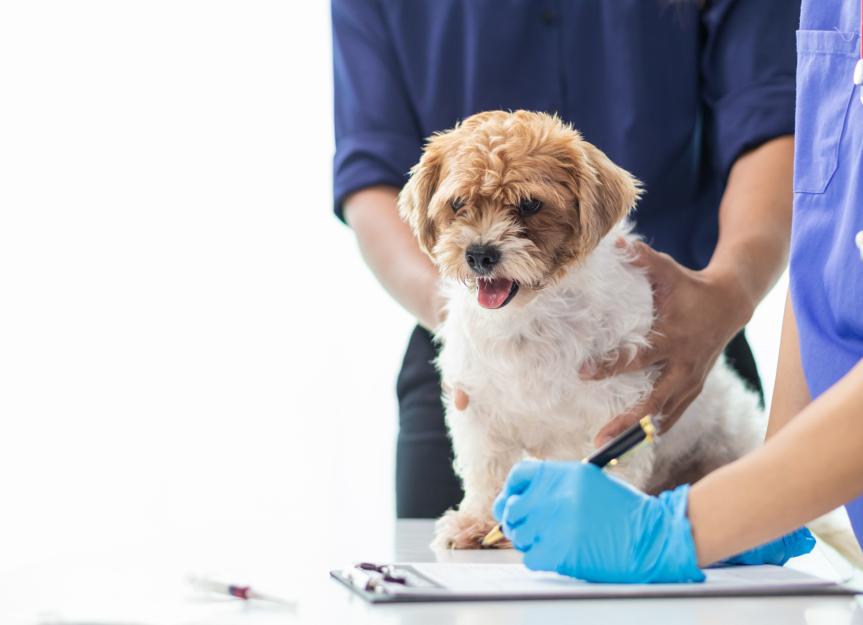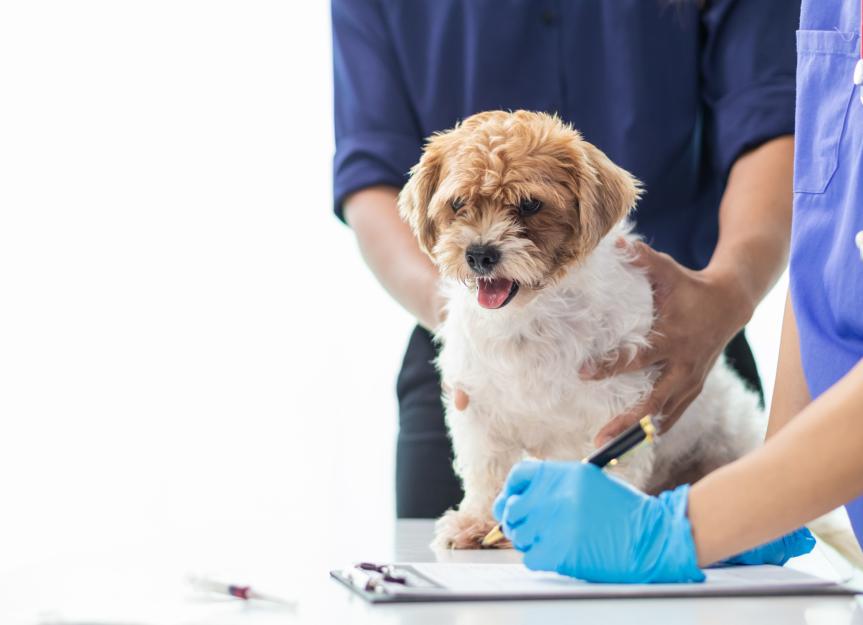
If your veterinarian suspects that your dog has allergies, they’ve likely talked to you about allergy testing.
Dog allergy tests come in several forms, with some more effective than others.
Find out about the types of dog allergy tests, why they’re recommended, and what you should expect from dog allergy testing.
Key Takeaways
- Dog allergy testing helps identify specific allergens that trigger symptoms and includes skin testing (IDAT), blood testing (RAST), and food trials.
- IDAT is the best way to diagnose environmental allergies, while food trials are the most reliable way to diagnose food allergies.
- Allergy testing can guide the development of immunotherapy treatments, which may not be necessary if symptoms can be managed with medications alone.
- Costs range from $200 to $500 for testing, and preparation may include stopping medications and fasting before procedures like IDAT.
What Are Dog Allergy Tests?
Dog allergy tests are performed to determine the cause of your dog’s allergic symptoms. These tests may include skin tests, blood tests, or food trials. The goal of dog allergy testing is to find the specific allergens that trigger your dog’s immune system.
Because allergic skin conditions are common in dogs, veterinarians often recommend allergy testing. However, if the pet parent declines testing, veterinarians can treat symptoms without knowing the results of an allergy test.
Allergy testing that involves multiple needle pricks can be painful for dogs, so skin testing is usually performed under sedation. Skin reactions to injected allergens can also cause discomfort from itching and swelling.
Types of Dog Allergy Tests
The three main types of dog allergy tests are:
-
Intradermal allergy testing (IDAT). With IDAT testing, the dog is sedated and a patch of hair on one side of their body is shaved. The veterinarian, often a dermatology specialist, injects small amounts of various allergens into the skin, then monitors each injection site for redness and swelling (i.e., a hive, or wheal).
-
Radioallergosorbent test (RAST). A RAST test is a blood test that measures antibodies against specific allergens. This test is usually sent to a laboratory for analysis.
-
Food trials. Food trials are the best way to do food allergy testing in dogs. During a food trial, the dog eats a special allergy diet for up to eight weeks.
-
Treats, flavored medications, and human foods are prohibited because they can interfere with results. If the dog’s symptoms improve while on the diet, food allergies are likely. To confirm which ingredients the dog is allergic to, foods are slowly reintroduced to observe reactions.
-
You may hear about hair or saliva tests for allergies in dogs, but the accuracy of these tests is not proven.
Speak with your veterinarian about which test is best for your pet.
Why Would a Dog Need Allergy Testing?
If your dog has symptoms of an allergy, your veterinarian may recommend canine allergy testing.
Before allergy testing, your veterinarian will rule out other common causes of itchy skin in dogs, such as fleas or skin infections.
Common allergy symptoms in dogs include:
Occasionally, dogs with food allergies develop loose stools or vomiting.
However, skin issues are more common than stomach problems in dogs with food allergies. Dogs can also develop watery eyes or sneezing like people with allergies, but these classic “hay fever” symptoms are less common in dogs.
Risks of Dog Allergy Tests
Some form of allergic reaction is expected with IDAT and food trials, which means itching, red skin, or localized swelling can develop or worsen because of the test.
The severity of these allergic reactions may vary, but your veterinarian can prescribe medications to keep your dog comfortable.
Rarely, a dog could develop an extreme allergy reaction called anaphylaxis, which requires immediate emergency treatment.
If your dog undergoes IDAT testing, they will be sedated for the procedure. Although not the same as general anesthesia, sedation still has a few risks, such as vomiting and aspirating (getting fluid into the lungs).
Your veterinarian will discuss risks with you and take steps to minimize danger, like fasting before the procedure.
Benefits of Dog Allergy Tests
Dog allergy tests help determine your dog’s allergy triggers, which can help you avoid them in the future.
A dog food allergy test or food trial may reveal the ingredients you should avoid feeding to prevent allergic reactions. The results of IDAT and RAST allergy testing can be used to develop allergy shots for your dog. Immunotherapy takes time to work, but it is effective for many dogs with environmental allergies.
Effectiveness of Dog Allergy Tests
IDAT is considered the gold standard for environmental allergy testing in dogs. RAST is usually considered less effective due to the potential for false positives, but it can still be helpful in identifying and treating dog allergies if IDAT is not attainable.
Food trials take time, but they are worthwhile for pet parents trying to avoid allergic triggers. IDAT is effective if you’re planning to pursue immunotherapy treatments for your dog.
Without allergy testing results, your veterinarian will rely on general allergy treatments like Apoquel or Atopica to control your dog’s symptoms.
Cost of Dog Allergy Tests
According to Nationwide Pet Insurance, dog allergy tests cost $200 to $500.
This cost covers diagnostic testing but does not include the cost of examinations or treatments for your dog.
For food trials, a therapeutic diet costs around $50 to $100 per month.
Preparing for Dog Allergy Tests
If your dog undergoes IDAT testing, they will be sedated for the procedure.
Your veterinarian will tell you when to fast your pup before their test to prevent the risk of vomiting while sedated.
A common recommendation is to withhold food after midnight the night before your visit, but you should follow your veterinarian’s specific instructions.
Water is usually OK.
Some medications, such as prednisone or Benadryl, can interfere with allergy testing results.
Many allergy treatments must be stopped several weeks before testing.
Ask your veterinarian about withdrawal periods for medications your dog takes and alternative methods to control itching before allergy testing.
Dog Allergy Tests FAQs
Is allergy testing for dogs worth it?
Food trials are helpful for ruling out food allergies and identifying food triggers, and these are generally considered worthwhile.
IDAT is worth it if you intend to pursue immunotherapy for your dog. RAST is not as accurate as IDAT but can be an option for pet parents interested in immunotherapy.
How do veterinarians test for allergies in dogs?
Veterinarians identify allergies in dogs by observing clinical signs and ruling out other skin conditions like parasites or infections.
Vets can test for specific dog allergies through food trials, skin testing, or blood testing.
Is there a test to see what your dog is allergic to?
Yes, there are tests available to identify your dog’s allergies. Food trials are the best way to test for food allergies. Skin testing (i.e., intradermal allergy testing, or IDAT) is considered the gold standard for environmental allergies, while blood testing (i.e., radioallergosorbent test or RAST) is another option.
How does a vet determine if a dog has allergies?
The veterinarian will first rule out other conditions that can cause similar symptoms. Once those are ruled out, the veterinarian can diagnose allergic skin disease. They may recommend a food trial to rule out food allergies or encourage the pet parent to pursue more specific allergy testing.
How can I get a dog allergy test?
Most veterinarians can guide you through a food trial for food allergies or blood testing for environmental allergies. However, skin testing, which is considered more effective than blood testing, may require a visit to a veterinary dermatologist.



